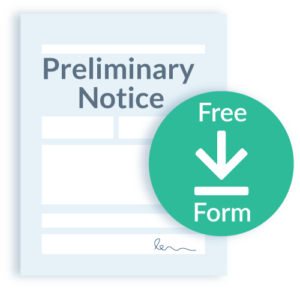Private projects
General contractors are not required to send notice on private projects.
General contractors are not required to send notice on private projects.
General contractors are not required to send notice on public projects.
Since GCs will not make a claim against their own bond for non-payment, they do not have bond claim rights, and have no preliminary notice requirement.
Subcontractors and suppliers are not required to send a preliminary notice on private projects to protect their lien rights.
However, claimants are required to send a Notice of Intent to Lien within 120 days of last furnishing.
Subcontractors and suppliers are not required to send notice on public projects.
However, on a state project, a subcontractor is required to inform the state procurement officer if the sub is aware the general received payment, but is late in making payment to the sub.
Maryland does not require a preliminary notice to be sent at the outset of a construction project to secure lien rights. However, any party may send a preliminary notice to promote project visibility, open channels for communication, and attempt to facilitate payment.
• See: Why You Should Send a Preliminary Notice Even If It’s Not Required
However, there is a Maryland Notice of Intent that must be sent prior to filing a mechanics lien in Maryland. For more information see: Maryland Notice of Intent Guide & FAQs
Since preliminary notices aren’t required, there is no specific timeline to send notice. However, if you do decide to send a preliminary notice there earlier the better. Increasing visibility and communication at the outset of the project can help speed up payments.
Preliminary notices are traditionally sent to the property owner. However, if you decide to send a preliminary notice, it’s best practice to send a copy to everyone up the payment chain; such as your hiring party and the prime/general contractor as well.
There are no specific requirements, so regular mail (or even email) will suffice.
Maryland does not require any preliminary notice to preserve a claimant’s right to make a claim against a payment bond on public projects. However, it’s a good idea to request a copy of the payment bond to verify the existence of the bond and ensure there aren’t any other notice requirements.
• See: Always Get A Copy of the Payment Bond if Working on a Public Project
i am sorry to hear about your troubling getting paid for the work you have done. It sounds like you know what you need to do, which is to file a mechnaic's lien as quickly as possible. While you are well within your time limitations for the almost completed hotel renovation, the other jobs may be approaching the filing deadline for a mechanic's lien, and I urge you to speak with an experienced construction attorney as soon as you can. I can be reached directly at joe@joekatzlaw.com to further discuss and/or to see if I can assist with the lien filing.
Good luck!
The fillable form for DC's notice of mechanic's lien addresses this, and indicates that a foreign entity (ie, not a DC entity) which does not transact regular business within the District, will need to provide its current license to do business in its home jurisidction, as well as a certificate of good standing from its home jurisidction issued within the last 180 days, as a prerequisite to fling a notice of mechanic's lien.
Please feel free to reach out to me directly (joe@joekatzlaw.com) for further assistance.
It would depend on if you provided legally adequate notice. You may be out of the time frame that would allow you to file a lien. Feel free to reach out to discuss specifics: savlawfirm.com/contact
In Maryland, like in many states, preliminary notices are not required for general contractors or other parties with a direct contractual relationship with the property owner. Maryland does, however, require preliminary notice from subcontractors, suppliers, and others who did not directly contract with the property owner. This notice is kind of more similar to a notice of intent than a traditional preliminary notice since it must be sent within 120 days from the date that the project participant last provided labor or supplies, and can sometimes be called a “notice of lien” despite not being an actual lien itself.
For single-family residential properties, there are some special deadline requirements. The notice must not only be sent within 120 days from the last day, the participant last provided labor or supplies but additionally prior to the property owner, making full payment to the general contractor.
It’s further important to note that liens filed on owner-occupied single-resident properties are also limited to a specific worth dependent on the contract (between the property owner and the general contractor) amount due at the time the property owners received preliminary notice. While there are many reasons that it is best to send preliminary notices early in the project, since the ultimate goal is to provide visibility into project participants, it is worth additional attention when the amount available to be secured by a lien claim depends on the amount left to be paid when notice is received. This means that while Maryland can be an unpaid balance lien state, there is a mechanism in place for subcontractors and suppliers to ensure that is not the case and to be fully protected.

First and foremost, read the guide to preliminary notices in Maryland. It breaks down all you need to know about the notice, including who must submit one, when they should submit one, and who the notice must be submitted to.

After you read the guide, download a free copy of the Maryland preliminary notice form. Our free forms are written by construction attorneys to meet the specific requirements under Maryland statutes. They meet the language and formatting rules, making this part easy to get right.

This part can get tricky because you must take care when filling your preliminary notice out. That’s because under Maryland law, mistakes on your preliminary notice could void your right to file a mechanics lien if you need to. Check your form multiple times to make sure everything is completely accurate.

Lastly, deliver your Maryland preliminary notice. Make sure you send it within the 120 day deadline, and send it to the owner via personal service or certified mail, return receipt requested.
If the owner cannot be located and served, you can post the notice on the job site in a conspicuous place as a last resort. Take a picture as proof it was properly posted.
Select Preliminary Notice document.
Provide basic job information.
Levelset sends the document for you. Postage included!